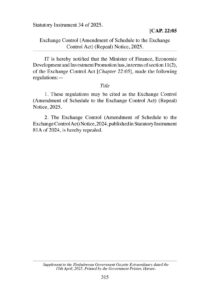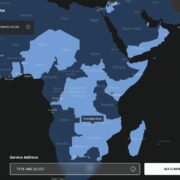The Zimbabwean government has repealed Statutory Instrument 81A of 2024, effectively scrapping the requirement for businesses to transact using the official exchange rate set by the Reserve Bank of Zimbabwe (RBZ). The move was formalized through Statutory Instrument 34 of 2025, issued by the Minister of Finance, Economic Development and Investment Promotion, and gazetted on April 15.
The now-defunct regulation had been one of the government’s key tools in trying to manage the country’s turbulent foreign exchange market, forcing businesses to peg prices to a rate that was frequently misaligned with the market reality. While officials argued that the measure was designed to promote price stability and rein in inflation, many in the business sector saw it as unworkable and damaging to operations, especially in an economy where foreign currency transactions are widespread.

The repeal signals a potential shift toward a more flexible exchange rate system, a move that could be welcomed by businesses and consumers alike. For months, companies have complained that the official rate lagged behind the black market rate, making imports more expensive and eroding profit margins. In many cases, dual pricing systems emerged, creating confusion and undermining efforts to stabilize the economy.
While the Finance Ministry has yet to comment publicly on the decision, the timing suggests a growing recognition within government that market realities cannot be ignored indefinitely. Whether this signals a broader liberalization of currency controls or a temporary adjustment remains to be seen, but the decision marks a significant departure from last year’s policy stance.
For a country still navigating the complexities of inflation, currency depreciation, and low investor confidence, the repeal of SI 81A could provide short-term relief for businesses—and an early indicator of further reforms to come.














Comments